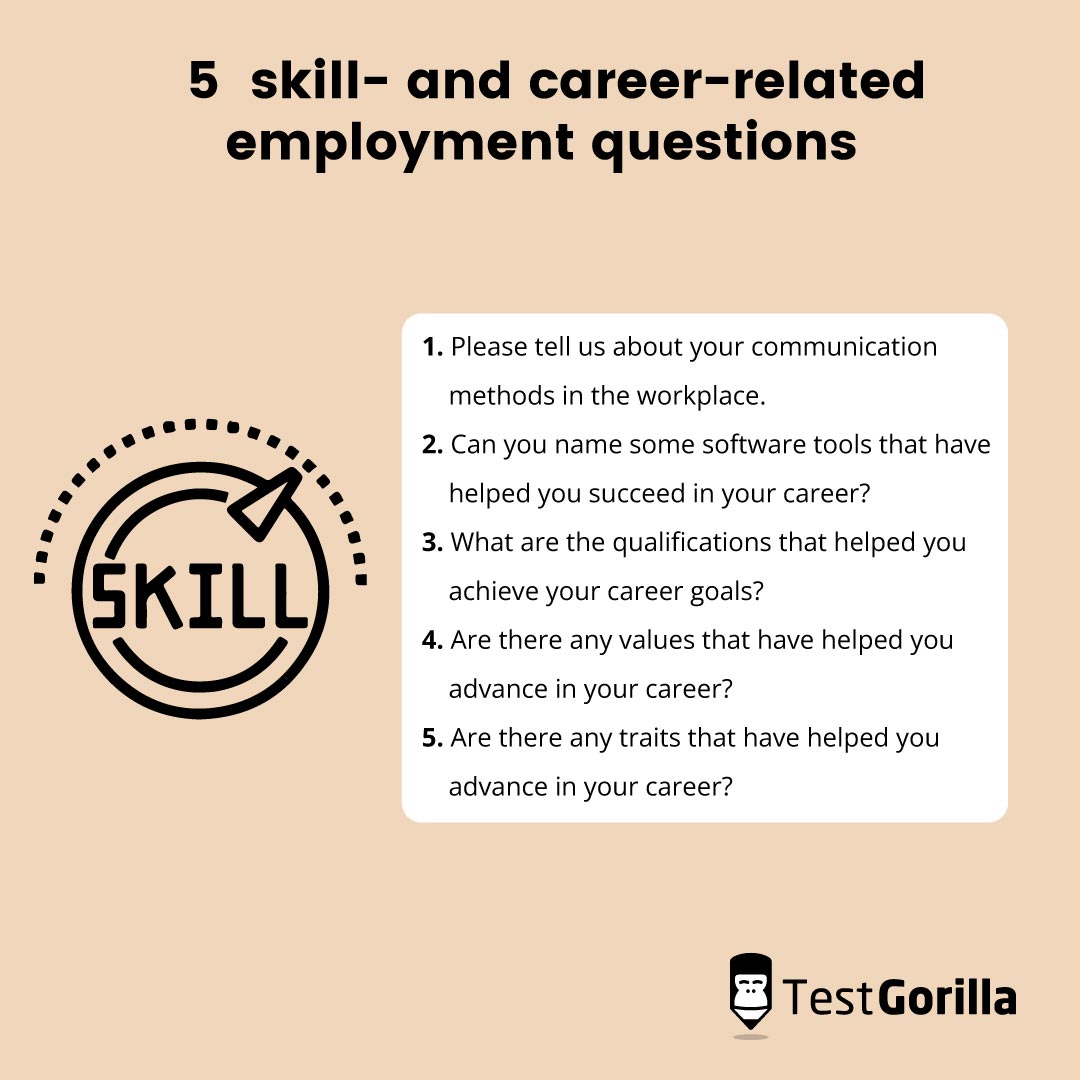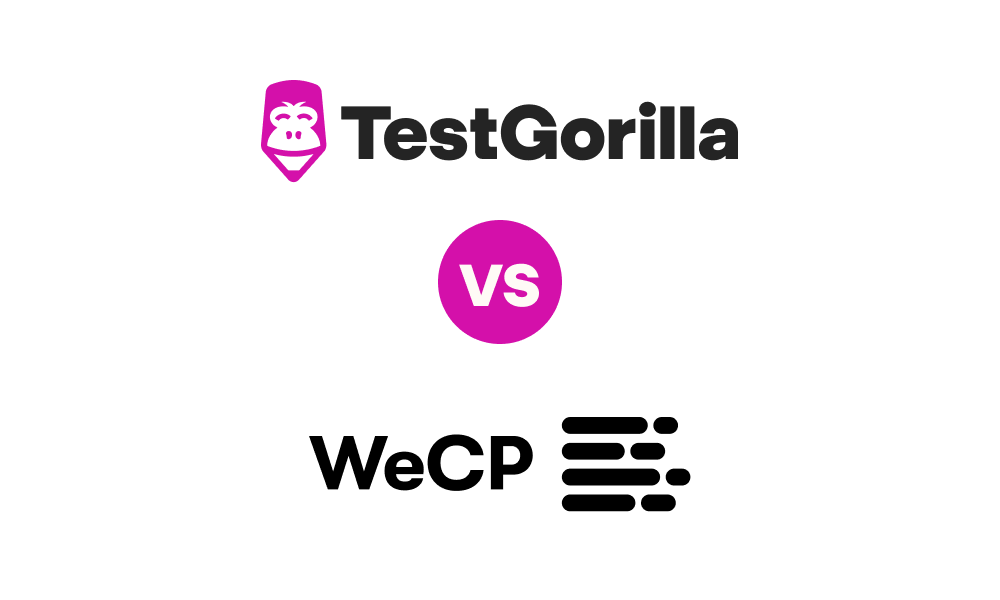Is your business looking to hire new talent to complete complex projects, take on more client work, or enhance your company’s services? If yes, you need a surefire way to figure out which candidates are the best.
But how can you assess them quickly? The answer is skill tests.
Using role-specific and cognitive ability skill tests in recruitment enables you to determine who are the candidates who truly have the skills you’re looking for. Essentially, this approach offers a chance to learn more about their experience and knowledge before you even speak to them.
You can then use this information to narrow down your list of applicants and invite only the best ones to an interview.
When it comes to the interviews, you also need to make sure you have the perfect employment interview questions. Getting your selection right doesn’t have to be difficult, though: Simply use some of our 70 questions below.
This way, you’ll find the perfect candidate for your company with minimal stress or difficulty.
Table of contents
- 24 basic employment interview questions to ask applicants
- 5 basic employment interview questions and sample answers
- 14 behavioral employment interview questions to ask interviewees
- 5 behavioral employment interview questions and sample answers
- 14 skills- and career-related employment interview questions
- 5 sample answers to skill- and career-related employment interview questions
- 18 employment interview questions about personal traits and work preferences
- 5 sample answers to employment interview questions about personal traits and work preferences
- Why should you combine skills assessments with employment interview questions when hiring?
- Hire a skilled expert for your team with employment interview questions and skills tests
✅ Hire a skilled expert for your team with employment interview questions and skills tests
24 basic employment interview questions to ask applicants
Ask applicants some of these 24 basic employment interview questions at the beginning of the interview to learn about their employment background.
1. Please tell us about yourself.
2. What are your best skills? Explain how they have helped in your career.
3. What are some skills you lack? Tell us how you aim to build them.
4. Please explain why you want this job.
5. Can you tell us what your ideal company would be like?
6. Can you tell us why we should hire you?
7. What factors do you dislike about your current or previous role?
8. Name a time you felt content in your current or previous role.
9. Please tell us about one skill that makes you stand out from other applicants.
10. Can you tell us what your main duties were in your last role?
11. Why do you want to leave your role?
12. Name three facts about this industry that will affect your role.
13. Name two things you learned about our company during your research.
14. Are you comfortable with hybrid work arrangements?
15. Have you ever worked remotely?
16. Please tell us about some of the projects you enjoyed working on.
17. What are the challenges you anticipate in this role?
18. Please tell us about some things you dislike in a company.
19. Are you currently applying for other positions?
20. Do you have any other interviews scheduled with other employers?
21. Do you have any questions for us?
22. What could your current organization do to be more successful?
23. What could our organization do to be more successful?
24. Please explain the goals you want to achieve in your career within two years.
5 basic employment interview questions and sample answers
Here are the answers to five of the basic employment interview questions to help you assess your applicants’ responses.
1. What are your best skills? Explain how they have helped in your career.
Role-specific technical skills (such as database management or experience with NoSQL, for example) and soft skills (such as communication and time management) are essential for employees hoping to advance in their careers.
Do they have the right skills to build relationships, solve problems, and tackle technical challenges?
Asking candidates to explain their skills will allow you to match their strengths with the needs of the business and will give you a better understanding of their previous experience.
Some candidates might mention soft skills such as written communication and project management, and explain that these abilities help them work with co-workers and complete projects on time. Others might mention technical skills such as Microsoft Word or Excel and discuss how they make it easy to create documents and manage data efficiently.
You can use skills tests to assess applicants’ skills objectively. Some of the tests you can find in our test library are our Microsoft Word, Time Management, Excel, or Communication tests; with them, finding the right person will be easy.
2. What are some skills you lack? Tell us how you aim to build them.
Candidates might not have all the skills mentioned in your job description, but this should not automatically disqualify them. They should, however, be interested in learning and improving – this ensures they perform well as the company grows.
For example, they may want to improve their time-management and analytical-thinking skills – these are just two of the many soft skills that 93% of employers want to see on their candidates’ resumes and enable candidates to work as part of a team and lead others when needed.
You can use our Problem Solving and Critical Thinking skill tests, among others, to assess applicants’ soft skills.
Understanding how candidates aim to improve is also important. This enables you to define the best approach to help your new hires gain new skills; having the right training and onboarding approach is essential for their success.
Listen for responses that explain how your candidates prefer to learn, which might include the following:
Independent research
Group training sessions
Technical-skills training
Understanding how your chosen candidate prefers to learn will be vital in helping you support them with adequate training and development. This will also help to narrow down candidates to those you can actively help succeed in the role.
3. Please tell us about one skill that makes you stand out from other applicants.
The best candidates often have a unique skill that others lack and will have used this skill to achieve good results in their careers. This helps them to stand out from the crowd and enables them to succeed in the role by offering something others lack.
For example, a software developer may have expert cross-platform software knowledge that others don’t. This skill will be particularly useful if you’re building an app that needs to function across all platforms and will enable them to help you build it as quickly as possible. This, in turn, will have a positive impact on productivity across the business.
Other candidates could have expert Java debugging skills helping them to fix bugs faster than others. This might help them address code issues swiftly and enhance the user experience, speeding up the creation process and ensuring higher levels of customer satisfaction.
Ask extra questions about their skills to learn more, or use skill tests, like our Windows Server Administration, Linux, or Java Debugging test, to evaluate these technical abilities.
4. Can you tell us what your ideal company would be like?
Are candidates able to explain what they’re looking for in a company and whether they can find this in yours?
If they have taken the time to research your organization, they should have a good understanding of its mission and values and whether this aligns with their preferences.
For example, 76% of prospective employees want to work in a company with a diverse and inclusive workforce. There are several reasons for this preference – candidates might prefer the sense of belonging, increased productivity, and better engagement that such an environment provides.
Consider if your candidates’ values match those of your company, but don’t forget to consider culture add rather than culture fit, i.e. to hire candidates who can actively add something to the existing culture of a team.
This approach helps you ensure you’re building a truly diverse workforce, which can improve creativity by exposing your team to new ideas, concepts, and ways of working – especially when you pair this with the right diversity and inclusion policies and training.
5. Please explain the goals you want to achieve in your career within two years.
Although not every candidate will know the exact details of what they want to achieve, they are likely a good match if they aim to stay with your company and advance as it grows. This shows their interest in long-term commitment, which can help you reduce staff turnover and boost morale and productivity within your business.
It also means that you will be more willing to invest in the candidate, as you know you’ll see long-term results.
For example, if a talented candidate aims to become a leader in your organization and your company is able to support them in developing their leadership skills, this will help with employee retention. Candidates will likely be more satisfied at their jobs if they receive the correct training.
Ask candidates follow-up questions about their training expectations during the interview to see if your company can offer the right support to help them improve.
14 behavioral employment interview questions to ask interviewees
Ask your interviewees some of these 14 behavioral employment interview questions to learn how they respond to challenging work-related situations.
1. Please tell us about the most recent project you led. Was it successful?
2. Please describe a time you put all your effort to achieve a goal at work.
3. Tell us about a time you received criticism for your work. Which actions did you take?
4. Name a time you were part of a team where someone performed badly.
5. Describe a time you had to give someone feedback for their work. How did you do it?
6. Please tell us about your biggest failure. What did you learn as a result?
7. Have you ever worked with a co-worker who irritated you?
8. Have you ever handled a task incorrectly? How did you correct it?
9. Can you describe a time you had to handle conflict in your role?
10. How would you respond if your company had been committing fraud?
11. Name an assignment that was too challenging for you. How did you handle it?
12. Tell us how you would complete multiple time-consuming tasks within a limited timeframe.
13. How would you make a complex work-related decision in a limited time?
14. Have you ever disagreed with your boss? How did you handle this?
5 behavioral employment interview questions and sample answers
Here are the sample answers to five important behavioral employment interview questions. Use them to check and evaluate your applicants’ responses.
1. Tell me about a time you received criticism for your work. Which actions did you take?
Candidates should be able to take specific actions to use feedback from managers or coworkers to improve their work. In fact, feedback delivered in the correct way can enhance productivity and performance – but for this, the person receiving it should also be willing to adjust.
Many state that they want more feedback, suggesting a willingness to improve and evolve within their role. The best candidates, however, are those who are able to remain motivated even after receiving criticism and to take the following actions to improve their work:
Listen carefully to the feedback
Ask questions about the aspects they didn’t understand
Avoid becoming defensive
Be open to new ideas
Look for opportunities to do things better
In this way, candidates can understand what went wrong, clarify any issues they’re unsure about, maintain a positive mindset, and produce high-quality work.
Ensure your applicants have the drive and willingness to improve by using our Motivation test. This test will help you understand whether your candidates’ expectations align with what you have to offer and gain an insight into whether you’d be able to support them in developing their skills.
2. Please tell us about your biggest failure. What did you learn as a result?
Although candidates may have failed at important tasks and projects in their careers, they might still be a good match for your company if they’re able to explain how they have improved. Plus, their willingness to discuss failures shows transparency and self-awareness.
For example, a content writer might tell you about the time they wrote an article that uses the incorrect tone of voice or in which they failed to use industry-specific language. In this case, the writer might’ve resolved to read the client’s brief and style guide more thoroughly to avoid such mistakes.
They might also use their soft skills, such as critical thinking or innovation, to rise from failure and stay productive. These skills help candidates ensure they’re able to come up with new ideas to enhance the quality of their work. A content writer, for example, might decide to research their client’s industry in more detail to write better articles.
If candidates can describe their results and mention how their work improved, this shows an ability to self-reflect. For example, reading briefs more thoroughly enables writers to produce higher-quality content that increases traffic to the client’s site.
3. Name a time you had to give someone feedback for their work. How did you do it?
Offering feedback to employees can positively affect a team’s performance. Team members are 3.6 times more likely to agree that daily feedback is useful compared with a work environment in which feedback is absent or rare.
Some specific methods applicants might use to give feedback to team members include to:
Provide precise and constructive advice
Focus on specific actions or behaviors to improve
Explain why the feedback is important
Listen to the employee’s perspectives or the challenges they face
Follow up with the employee to ensure they are making the required changes
The best candidates should understand how to provide constructive and positive criticism, which helps ensure that team members stay motivated, while still having a clear roadmap of the steps they need to take.
They should also know to provide the correct resources and technical training to ensure the team improves their output and productivity. Employees who receive proper training are more likely to be effective and committed.
4. Tell us how you would complete multiple time-consuming tasks within a limited timeframe.
Candidates should know that task-prioritization methods are essential when aiming to complete multiple tasks by a specific deadline. They should be able to create a plan to efficiently manage their time and allocate blocks of time to each task. Remember to ask for specific examples and strategies they use.
Interviewees should also know to set clear deadlines for each task and use the following methods to meet them:
Timeboxing
The Pomodoro technique
Project-management software
Delegation
With such techniques, applicants can focus more on each task, receive the support they need, and manage the project workflow efficiently to complete tasks on time. They can do this by establishing specific timeframes to complete the work, tracking their progress, and staying motivated.
Use our Project Management test to assess the time- and project-management skills of your candidates.
5. Name an assignment that was too challenging for you. How did you handle it?
Not every assignment will be easy for your candidates, but they should have strategies in place if challenges arise, such as communicating their concerns with their team leader or asking questions about the assignment.
By asking the right questions about the task, candidates can collect clear, concise instructions from their leaders, who can then:
Create collaborative goals
Support team members with problem-solving
Provide the right resources to enhance the team’s work
Candidates should also be comfortable with requesting support from their team members to complete difficult projects. This can be particularly useful if others have expertise in areas in which they lack it.
Alternatively, some applicants might consider asking for on-the-job training, such as technical training or soft-skill mentoring. This approach allows them to upskill and use their new abilities to finish challenging tasks, while still keeping up with the changes and requirements of their current role.
14 skills- and career-related employment interview questions
Ask your candidates some of these skills- and career-related employment interview questions to learn more about their abilities and career progression.
1. What is the salary range you expect for this role?
2. Can you tell us about your career development ambitions?
3. How do you aim to improve your skills in the next six months?
4. What are your training and onboarding preferences?
5. Please describe your career journey so far.
6. Are there any traits that have helped you advance in your career?
7. Please tell us about your communication methods in the workplace.
8. Can you name some software tools that have helped you succeed in your career?
9. Tell us one factor that motivates you to perform well at work.
10. Are there any values that have helped you advance in your career?
11. What are the qualifications that have helped you achieve your career goals?
12. Please tell us about your problem-solving skills.
13. Please describe your project-management skills.
14. Please tell us about your critical-thinking skills.
5 sample answers to skill- and career-related employment interview questions
Here are five sample answers to quickly assess your candidates’ responses to skill- and career-related employment questions.
1. Please tell us about your communication methods in the workplace.
Each candidate will have unique communication methods, such as using verbal and written communication, active listening, and clarifying instructions, that they use in the workplace. They can use these skills to share project goals with team members and establish the right approach to complete them.
When reviewing their responses to this employment interview question, your main goal is to determine whether their methods match the specific situations or context in which they need to communicate.
An instant message is sometimes sufficient when sharing a quick update with a team. In other scenarios, such as during training or onboarding, a team meeting might be more suitable to ensure all team members understand the company’s requirements.
Communication is crucial in a company and helps ensure that teams don’t complete tasks incorrectly or harm the company’s reputation with poor work.
Use our Communication test during hiring to determine whether your candidates have adequate verbal and active-listening skills for efficient communication.
2. Can you name some software tools that have helped you succeed in your career?
Using the right software tools can help employees succeed in the short and long term, so it’s important to ask candidates which platforms they use and for what purpose. In response to this question, each candidate should mention a few examples of applications that enhanced their work.
For example, a content writer may use the following software tools to improve their grammar and make their content more readable:
Grammarly
The Hemmingway app
ProWritingAid
Some of the apps they mention may match the ones you use in your organization, making it simpler for applicants to join your team and adapt to your existing processes.
Don’t forget to ask your candidates what kind of success they’ve had with the platforms they mention. In the content writer’s case, they might have honed their editorial skills, for example.
3. What are the qualifications that helped you achieve your career goals?
If your applicants’ qualifications match your job description, they may have an advantage over other applicants: Their in-depth knowledge might enable them to progress faster. While this can be helpful, applicants don’t need to have every qualification on your list.
Many applicants might still have industry-specific expertise that they’ve acquired on the job rather than in an academic environment – or seemingly unrelated qualifications that enable them to perform better.
When interviewing candidates, it’s important to consider whether they meet the must-have criteria for your role and be flexible for the rest. If a qualification is merely a “nice-to-have”, don’t disqualify applicants if they don’t have it. Instead, consider how their specific qualifications have helped them achieve their career goals.
4. Are there any values that have helped you advance in your career?
Values such as innovation and teamwork help applicants advance in their careers and achieve good results for their companies.
Innovation helps candidates tackle challenges in new ways to meet their clients and organizations’ goals. New ideas can enable them to streamline existing processes and boost productivity.
Prioritizing teamwork, on the other hand, can help candidates be more in-tune with their teams and collaborate more efficiently to solve problems.
Evaluating the values of your candidates and learning what they’re able to add to your company is important. You can do this with our Culture Add test.
5. Are there any traits that have helped you advance in your career?
There are specific traits that are associated with better work performance and looking for these in candidates can help you make the right choice.
Candidates should be able to explain how traits such as conscientiousness, steadiness, and the ability to influence others helped them advance in their careers. For example, conscientiousness, which studies show is a valid predictor of job performance, might help them be more receptive to feedback.
Knowing your candidates’ strong traits can help you hire the right person for the job. You can also use our DISC Personality test to evaluate their traits before you make a decision.
18 employment interview questions about personal traits and work preferences
Ask your talent some of these employment interview questions about their personal traits and work preferences to determine how they would enhance your company culture and improve team dynamics.
1. Which word or words would you use to describe your style of work?
2. What is your favorite working environment?
3. Do you prefer a structured or innovative work culture?
4. Which techniques do you use to stay organized?
5. Do you focus on the full scope of a project or on the details?
6. Tell us about your most important achievement.
7. Which managerial style do you prefer and why?
8. Name one person who influenced your career choices.
9. Is there a specific leadership style that inspires you to stay productive?
10. How would your previous boss describe you?
11. Are there any traits you wish you had that could enhance your work?
12. Name two qualities that you look for in a leader.
13. Are you subscribed to any industry-related magazines or blogs?
14. Would you continue working in this industry if you won the lottery?
15. Would you describe yourself as conscientious?
16. Do you work on any side projects in your free time?
17. Are you most productive in a team or when working solo?
18. Please tell us something about you that we wouldn’t find on your LinkedIn profile.
5 sample answers to employment interview questions about personal traits and work preferences
Here are the sample answers to five of the most important employment interview questions about personal traits and work preferences. Use the answers to review your candidates’ responses.
1. Would you continue working in this industry if you won the lottery?
The answer to this question will help you assess your candidates’ honesty and values. If your candidate is genuinely enthusiastic about their work and passionate about joining your organization, they would still be open to continuing to work in the same industry even after winning the lottery.
Even if candidates have other interests, such as traveling or being with their family, they should be able to explain how they would balance their ambitions with their career goals. For example, they might work part-time hours or take a sabbatical to accomplish their aspirations and then return to work.
2. Do you work on any side projects in your free time?
Working on side projects during free time can help potential employees enhance their skills and performance. Side projects can give applicants the freedom to embrace their creativity and, as a result, boost their independence.
For example, some candidates might work on projects for open-source software apps to enhance their Python programming skills, such as their ability to implement data structures or objects. These skills are transferable to the workplace and can help employees provide better results.
Marketers and influencers might produce videos outside of work to practice their video-editing, graphics-optimization, and promotion skills, which are, again, transferable to a marketing role.
Ask extra questions about candidates’ interest in work-related projects and any previous experience they may have. You can test their abilities using role-specific skills tests.
3. Are you subscribed to any industry-related magazines or blogs?
Your best candidates will be eager to keep up with the latest developments in their industry. For this, they might subscribe to industry-related magazines, which share expert knowledge that can be useful in their jobs.
Can they give examples of major publications that offer industry-specific insights? For instance, copywriters and technical SEO experts may subscribe to Ahrefs’s Digest, the SurferSEO Academy Shorts, or the Moz blog. Software engineers might subscribe to the GitLab Monthly or the GitHub Insider newsletters.
Consider whether applicants can talk about any recent news from the industry and explain why they’re important. This shows they are up to date with the latest developments that may be relevant to their role.
4. How would your previous boss describe you?
Positive candidate descriptions from previous employers are a testament to their character and can provide valuable insights. They can help you understand how your team dynamic might change if you hire the applicant.
For example, a teacher might receive praise from their boss due to their creative lesson plans. A receptionist might receive positive comments from their team leader about their attention to detail.
The best way to verify these comments is to check your candidates’ references. A reference check can help you assess the values your new hire will add to your company and verify their skills and qualifications.
Contact your applicant’s previous employer to confirm the accuracy of your candidate’s response – but remember to ask them first, as they might not yet have announced they’re quitting.
5. Are you most productive in a team or when working solo?
The ability to work both as part of a team and individually is ideal – and would help a new employee adapt to different situations. Even though applicants might prefer one work style over the other, they should know that both have their place – working individually helps them hone their skills and working as a team helps build workplace relationships.
Consider whether applicants can provide specific examples of situations when they worked in a team and individually, and whether they produced good-quality work.
For example, a software engineer may work well on their own when coding but they should also be able to work with a software-testing team to fix bugs and enhance the user experience.
Why should you combine skills assessments with employment interview questions when hiring?
Combining skill-assessment methods like skill tests with employment interview questions has several advantages. Skills assessments help to eliminate unconscious bias during candidate evaluation. They also reduce your time-to-hire and save you time and effort in the early stages of recruitment.
If you use skills assessments before interviews, you’ll already have a solid foundation to work with. You can check your candidates’ strongest skills and ask more questions or address any skills gaps in the interview.
Hire a skilled expert for your team with employment interview questions and skills tests
So, how can you find the perfect candidate? Start by learning more about skills assessments and how to use them.
We offer role-specific, personality and culture, language, and many more skills tests to help you hire the best talent for your company. Ask candidates to take a skill assessment (consisting of up to five skill tests) to shortlist the most promising applicants. Then, you simply need to use the right interview questions to make the right hiring decision.
Sign up for a free 30-minute demo to see how our platform works and see for yourself why thousands of companies have chosen TestGorilla to streamline their hiring processes.
Related posts
Hire the best candidates with TestGorilla
Create pre-employment assessments in minutes to screen candidates, save time, and hire the best talent.
Latest posts
The best advice in pre-employment testing, in your inbox.
No spam. Unsubscribe at any time.

Hire the best. No bias. No stress.
Our screening tests identify the best candidates and make your hiring decisions faster, easier, and bias-free.
Free resources
This checklist covers key features you should look for when choosing a skills testing platform
This resource will help you develop an onboarding checklist for new hires.
How to assess your candidates' attention to detail.
Learn how to get human resources certified through HRCI or SHRM.
Learn how you can improve the level of talent at your company.
Learn how CapitalT reduced hiring bias with online skills assessments.
Learn how to make the resume process more efficient and more effective.
Improve your hiring strategy with these 7 critical recruitment metrics.
Learn how Sukhi decreased time spent reviewing resumes by 83%!
Hire more efficiently with these hacks that 99% of recruiters aren't using.
Make a business case for diversity and inclusion initiatives with this data.


















